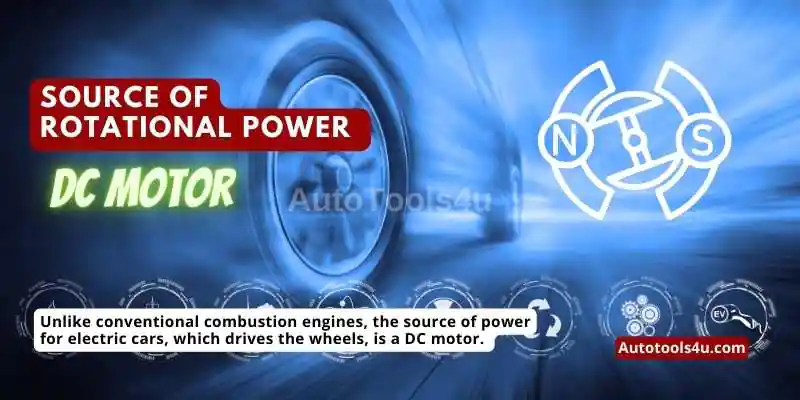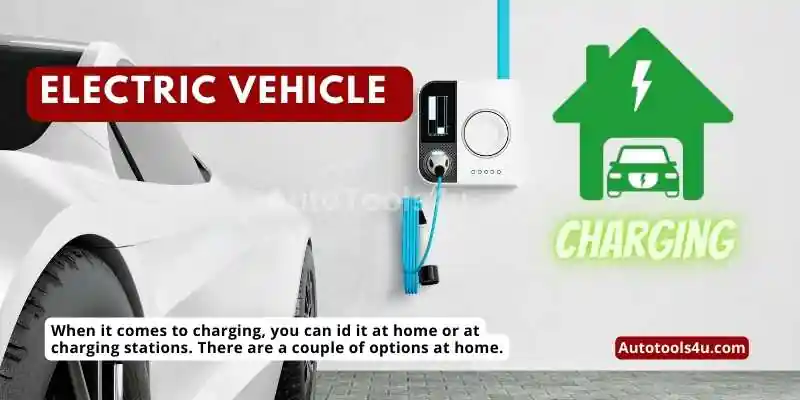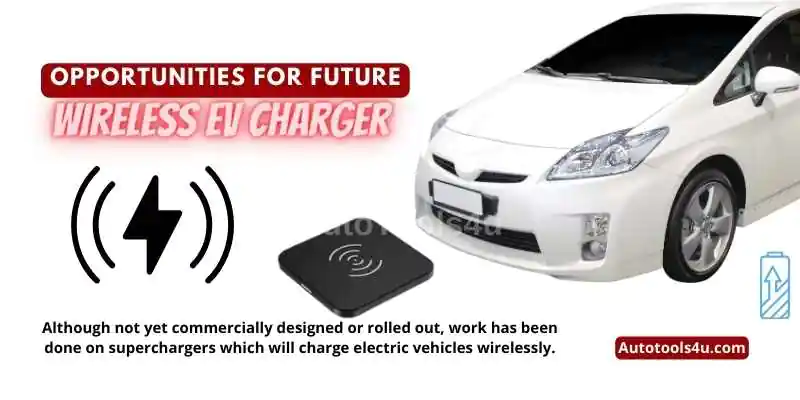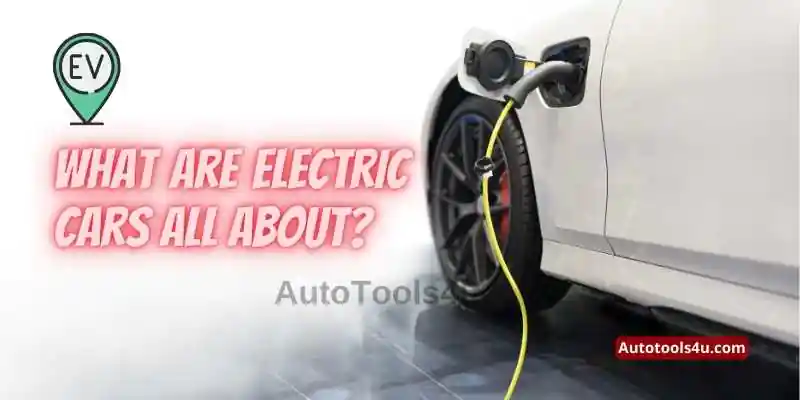There is a lot of buzz about electric cars these days and rightly so, they are a fascinating opportunity for the future, which is meaningful and exciting. However, fossil fuel-based internal combustion automobiles remain the primary means of transportation for urban human beings.
In this article, we shall try to explore some of the terminology and ideas surrounding the phenomena of electric cars and compare some facts and figures to answer some very popular questions.

1.1 Source of Rotational Power – DC motor
Unlike conventional combustion engines, the source of power for electric cars, which drives the wheels, is a DC motor. In other words, the drive-train is powered alone by a DC motor, unlike hybrid where the drive-train constitutes a combustion engine and DC motor or both. With the DC motor in question, obviously, the ultimate source of power is batteries. A lot of them bunched together to form a composite battery unit that would supply the driver-train motor and other electronics in the car including AC and heaters.
1.2 Surprise, EV Still Carry 12 Batteries
There is still a 12V battery fitted in electric cars as required by the standard, as car and ECU electronics use conventional 12V power sources. It is this battery that operates all the critical electronics and functions of the car and control it. It is this battery that starts the EV system so it’s critical that it’s healthy and charged most times. These 12V battery functions are similar to what it does in combustion engine cars, except that it doesn’t run a starter motor. This implies that 12V batteries in electric cars don’t need to be big and power rich, hence it can fit in modest spaces and is of a compact footprint.
If you have not driven your electric car for a while, there may be a chance that the 12V battery drains out, rendering your EV a non-starter. If this occurs, you need to jump-start your electric vehicle using the jump-start method as you would do for any conventional combustion engine car. Locate the battery position and jump-start it using either another car or a jump starter kit.
One thing to note is you may jump-start your EV however you cannot use your eV to jump-start another vehicle. 12V Battery is too small for this purpose and this step is not without its risks. If you embark on this risky path, your target car will not start anyway and you risk considerable damage to the electronics of your EV.

1.3 Electric Vehicle Charging
When it comes to charging, you can id it at home or at charging stations. There are a couple of options at home.
1.3.1 EV Plug or Interface Types
Type 1 – This is a 5 pin system and common in the US. It has no interlock system and comprises of single-phase
Type 2 – This is a 7 pin system and is used on most new electric cars. This has got interlock and use 3 phase AC hence Type 2 is one used for rapid charging. This type also supports rapid DC charging.
1.3.2 Electric Car Charging – Mains based EV charger
EV can be charged using a specified charger that connects to the mains AC plug and provides charging directly to EV. Since the current drawn from the mains plug is limited, mains based chargers is slow and will take time to charge fully, however they are cheap and easily connectable to the mains plug. If you are driving very long journeys frequently and need to charge the car infrequently as a consequence, this option works very well. One issue is, especially when the car is not parked in the garage, the inconvenience of connecting cable to AC mains as these are not always available outside the garage. This type of connection will provide power up to 2.2KW.
1.3.3 Electric Car Charging – Fixed Wall Charging Point
Since it takes longer to charge from AC mains based chargers, one solution is to install intelligent Wall charging points. This will allow for faster charging as well as ease of operation as these are weatherproof can safely work outdoors without any issues. They tend to be expensive options as compared to mains based, however, if you have multiple EVs and/or drive long distances frequently, this is an efficient choice. With a single-phase system, it can provide power up to 7KW.
1.3.4 Electric Car Charging Time
Most electric cars in the UK carry 50 KWH batteries, with a typical range of 200 Miles.
We can do some basic maths for a full re-charge of a 50 kWh battery.
- Case 1 – At Home, Mains-based 2.2 KW charger => 22 Hours Approx.
- Case 2 – At Home, Wall mounts 7 KW system => 7 hours Approx.
- Case 3 – At Station, Rapid Charging 50KW system => 1 Hour Approx.
Each KW is approx. 4 Miles of Range
- 2 KW Charger system equates to 8 miles / Hour
- 7 KW Charger system equates to 28 Miles / Hour Approx.
- 50KW Rapid charging system equates to 200 Miles / Hour Approx.
A very useful electric car range calculator is presented on our website.
1.3.5 Planning your journey – Electric Car Charging
How long does it take to charge an electric car? This question has been on everybody’s mind for some time now. Before we ascertain that figure, let’s take into consideration some facts. The time taken to fill up a combustion engine takes only a few minutes, and conventional Fossil fuel gas stations are available abundantly. Somehow, on the contrary, it takes far longer to charge an electric car and there are far fewer charging stations available. With that in mind, one needs to be slightly more prepared in advance if they are embarking on a relatively long journey using an electric vehicle and planning to come back home using their car, not on a recovery service truck 😊
There are not enough electric charging points in the UK for example, however, there are maps and applications which will indicate the locations of charging stations on your route, take notes of as many as you can and save GPS locations in your smartphone. EDF Energy has published a very useful guide on electric car charging points. There is also a electric car charging points finder published by car wow.
Make sure that you charge up before the long journey. Even If the journey is well within the range of the EV charge capacity, take time to have short breaks at charging stations and rapid charge for short intervals to boost the charge. Don’t wait for the charge to go down in RED, just top-up when you can.
If you are going somewhere overnight with safe access to the main AC plug then take your charging kit along, that will help a lot as you can leave your car charging overnight.
The name of the game is planning, planning, and planning. If you are prepared and done your homework, you shall be fine driving your electric vehicle on a 1000 KM epic journey, from Land’s End to John O Groats 😊

1.4 Opportunities for Future – Wireless EV Charger
Although not yet commercially designed or rolled out, work has been done on superchargers which will charge electric vehicles wirelessly. The principle is no different the charging your phone or other devices wirelessly, it it’s just on another scale or league.
Trials will take place in Europe and UK and technology can be rolled out publicly in the next few years. Wireless charging shall be a great step in simplifying the process of EV charging and will revolutionize the roadmap for broadening the horizons for electric automobiles.
Epilogue
Autotools4u is a new shining star in the front of auto care, information, and development that is updated with the latest industry trends and ideas. we have a collection of articles on varied topics, anything from car wash tips to maintaining your brand-new Tesla. keep us bookmarked on your devices and check for new articles and information which would help you in routine car maintenance as well as following up on the latest industry trends.
